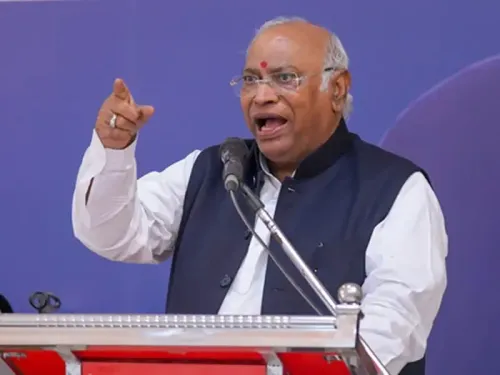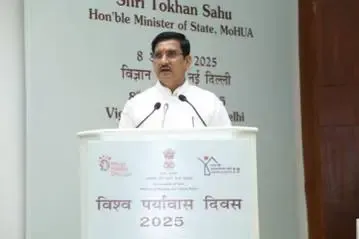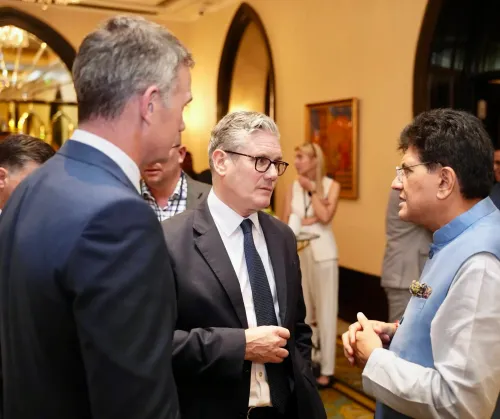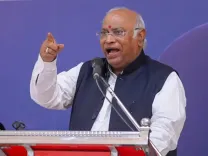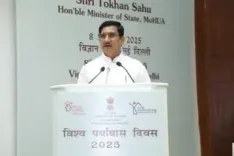Has Asim Munir's Existential Crisis Triggered Deceit and Narrative Warfare?

Synopsis
Key Takeaways
- Asim Munir has made controversial claims regarding India's military actions.
- The Pakistan Army is facing significant internal and external challenges.
- India maintains a stance of vigilance and resilience against Pakistani narratives.
- Public perception plays a crucial role in the narrative battle between the two nations.
- Constructive dialogue is essential for peace and stability.
New Delhi, Aug 20 (NationPress) The Chief of the Pakistan Army, Field Marshal Asim Munir, has stirred controversy once more. At a recent gathering in Belgium, he proclaimed that India requested a ceasefire during the latest India-Pakistan skirmish.
This is yet another instance of Munir resorting to falsehoods, as evidence from India reveals a starkly different reality. This pattern of deceit is not new; Munir has made similar unfounded claims in the United States and back in Pakistan.
Former Indian Army Chief General V P Malik commented on the tendency of some army leaders to engage in bluff and bravado.
General Malik stated on X, "Pakistani leaders, especially certain Army Chiefs, indulge in bluff and bluster. The appropriate response is to stay vigilant, react on the ground when necessary, and continue strengthening our national power—there's no need to participate in their daily theatrics."
Munir's most recent comments were made on August 11 during a private event hosted by the Overseas Pakistani Foundation at Groot-Bijgarden Castle near Brussels, attended by approximately 500 members of the European Pakistani community.
According to Abhinav Pandya, founder of the Usasanas Foundation, an Indian foreign policy and security think tank, Munir’s remarks reflect his desperation, especially given the numerous challenges the Pakistan Army faces.
The Balochistan National Army (BLA), Tehreek-e-Taliban Pakistan (TTP), and the Taliban have dealt significant blows to the Pakistan Army, undermining Munir’s leadership and raising questions about the institution's very existence.
As he sought reappointment, Munir's position was jeopardized by his army's unfavorable circumstances, with his legacy under scrutiny due to the losses suffered, Pandya remarked. If the army faltered, it could jeopardize Pakistan's very existence.
In truth, Munir's assertions are mere fabrications and part of an ongoing narrative struggle. For instance, during India's Operation Sindoor, US Secretary of State Marco Rubio contacted Indian External Affairs Minister S Jaishankar at 9:30 am on May 10 to relay that Pakistan was seeking a ceasefire. This request followed India's strike on the Nur Khan air base with BrahMos and SCALP missiles. Jaishankar informed Rubio that any ceasefire proposal should be communicated by the Pakistan DGMO through official channels.
Pandya notes that Pakistan recognizes its inability to compete with India economically or militarily, rendering conventional tactics ineffective. Under strong leadership, India has demonstrated its unwillingness to tolerate Pakistani misadventures. Consequently, Pakistan has opted for a battle of narratives, and Munir's bluffs are attempts to preserve his image and that of his army.
As for whether the Pakistani populace believes Munir's fabrications, Pandya suggests it is challenging to determine. There is widespread disdain for the corrupt leadership, yet a paradoxical blind admiration for extremism persists. Munir is adept at leveraging this sentiment to promote an anti-India narrative effectively.
Furthermore, Pakistani society is not composed of saints; it is heavily radicalized. Even in the absence of military leadership, figures like Masood Azhar would still exert influence, he added.
India maintains that Munir's remarks are part of a familiar Pakistani playbook. The Ministry of External Affairs has labeled Munir's assertions as nuclear saber-rattling.
“We have noted the comments reportedly made by the Pakistani Chief of Army Staff during a visit to the US. Nuclear saber-rattling is Pakistan’s usual tactic,” stated the MEA.
Munir has attempted to leverage this narrative, but India countered the nuclear bluff during Operation Sindoor. Even after this operation, Munir asserted in Washington that they are a nuclear state, stating, "If we are going down, we will take half the world with us," according to media reports.

